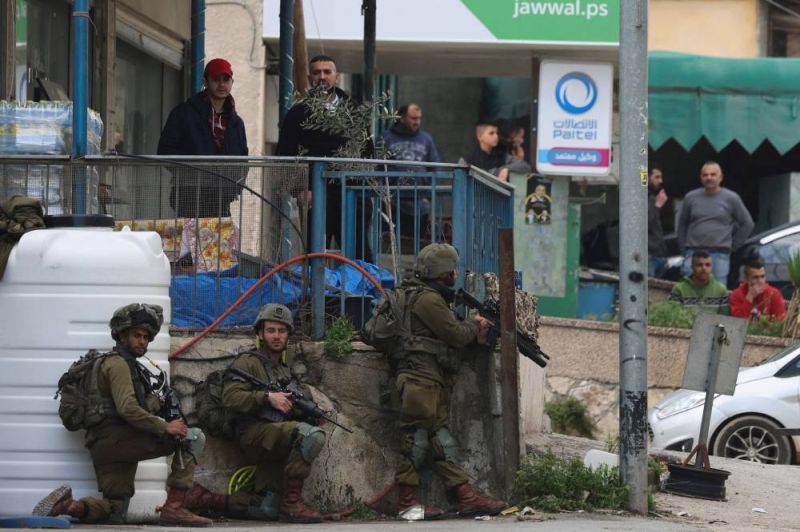
Residents look on as Israeli soldiers take position in the occupied West Bank town of Huwara, on March 26, 2023. (Credit: Jaafar Ashtiyeh/AFP)
A decade after cutting diplomatic ties, Saudi Arabia and Syria intend to reopen embassies in each other’s territories, sources told Reuters. Saudi Arabia earlier this month re-established ties with Iran, seen as a bellwether of regional detente. The president of the United Arab Emirates, last Sunday, received his Syrian counterpart Bashar al-Assad, expressing his desire to see Syria “return” to the Arab fold — more than a decade after its expulsion from the Arab League.
Deadly violence persisted in the West Bank a week after Palestinian and Israeli officials, fearing escalation during Ramadan, met on March 19 in Egypt for a second round of talks to de-escalate violence, AFP reported. The Israeli parliament on Tuesday authorized settlers’ return to four settlements from which they had been evicted in 2005, prompting international criticism. Palestinians have suffered their deadliest year in more than a decade, as violence continues to escalate in the West Bank in the form of settler rampages and raids by the Israeli military — which, last Thursday, shot dead a Palestinian man in the first such killing in the West Bank during Ramadan. Palestinian militant organizations rejected the talks, while attacks on Israelis injured one man this week.
Iran may face accusations of crimes against humanity for its mistreatment of protesters, the United Nations special rapporteur on the country told the UN Human Rights Council, as new international sanctions rolled in, AFP reported. Javaid Rehman, special rapporteur on Iran, said he had evidence that Mahsa Amini died while in Iranian morality police custody “as a result of beatings,” which the state has repeatedly denied. Rehman said that 527 people, including 71 children, died during the protests, claiming to have evidence that the Iranian regime has perpetrated murder, imprisonment, enforced disappearances, torture, rape, sexual violence and persecution. Meanwhile, the UK and European Union issued new sanctions targeting Iranian officials. Iran denied the allegations, and, later in the week, called on France to listen to its protesters after a retirement age revision sparked an ongoing wave of protests.
Turkey’s third-largest party, the pro-Kurdish Peoples’ Democratic Party (HDP), opted out of nominating an independent presidential candidate, sparking doubts of incumbent Recep Tayyip Erdogan’s ability to extend his two decades in office. Despite criticism of the government response to the devastating Feb. 6 earthquake — which, according to a new government estimate, caused $104 billion in damages — Erdogan came out ahead in popularity polls last month after winning back favor lost during the previous year’s economic crisis. New figures, however, show Erdogan lagging 10 points behind the opposition. The National Alliance, a six-party coalition thought capable of unseating Erdogan, recovered from a disagreement over their preferred candidate, Kemal Kilicdaroglu, the leader of the Republican People’s Party, and are now receiving the implicit support of the HDP.
Iraq marked 20 years since the US and UK invasion that brought an end to Saddam Hussein’s rule while propelling the country into years of deadly violence. The invasion of Iraq began on March 19, 2003, after a failed attempt by the UN International Atomic Energy Agency (IAEA) to dissuade the US and Britain by debunking evidence claiming that Iraq was developing nuclear weapons, recalled UN director at Human Rights Watch Louis Charbonneau, who covered the UN weapons inspections prior to the Iraq war. “While the start of the war was an illegal and disastrous decision, the management of the aftermath of the war proved to be even worse,” former Lebanese Culture Minister Ghassan Salame told L’Orient Today. In October 2019, widespread protests began from Baghdad’s Tahrir square culminating Iraqi frustration with the system of religious or ethnic quotas established on the ruins of the Baathist dictatorship and which have plunged the country into repeated wars and mismanagement.
Israeli Prime Minister Benjamin Netanyahu on Monday delayed by a month implementation of a judicial overhaul which has repeatedly sparked protests. The postponement came after Netanyahu’s government survived a no-confidence vote the same day, following an overnight demonstration by tens of thousands of protesters decrying the planned judicial overhaul. Israeli President Isaac Herzog called for a stop to the judicial overhaul — which includes plans to limit the Israeli Supreme Court’s reach and expand the government’s sway over appointments. The plans have been met with widespread protests criticizing the power the legislative changes would grant the Israeli government.
Compiled by Abbas Mahfouz